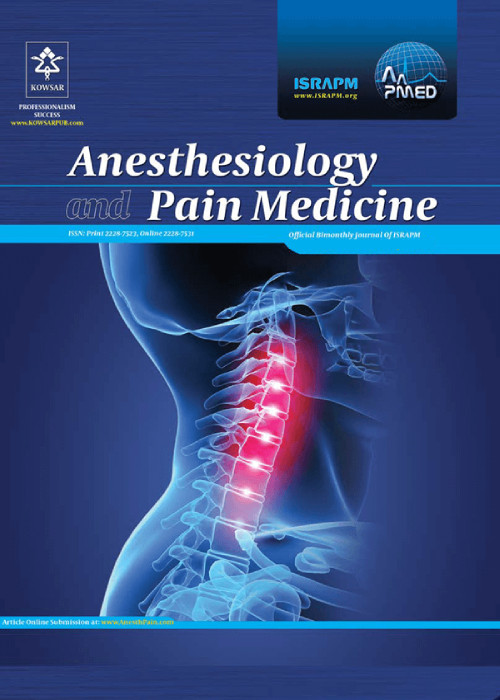Magnesium Can Decrease Postoperative Physiological Ileus and Postoperative Pain in Major non Laparoscopic Gastrointestinal Surgeries: A Randomized Controlled Trial
Author(s):
Abstract:
Background
Magnesium is an antagonist of (N-methyl D-Aspartate) NMDA receptor and its related canals, and may affect perceived pain.Objectives
The aim of this study was to evaluate the impact of intravenous magnesium on the hemodynamic parameters, analgesic consumption and ileus.Patients and Methods
A randomized, double blind, placebo controlled study was performed. Thirty two patients of ASA I or II, scheduled for major gastrointestinal (GI) surgery, were divided into magnesium and control groups. Magnesium group received a bolus of 40 mg/kg of magnesium sulphate, followed by a continuous perfusion of 10 mg/kg/h for the intraoperative hours. Postoperative analgesia was ensured by Morphine patient–controlled analgesia (PCA). The patients were evaluated by Intraoperative hemodynamic parameters, the postoperative pain by numeral rating scale (NRS), and the total dose of intraoperative and postoperative analgesic consumption. Postoperative hemodynamic, respiratory parameters, physiological gastrointestinal obstruction (ileus), and side effects were also recorded.Results
The study included 14 males and 18 females. Age range of patients was 17 to 55 years old. The average age in the magnesium group was 41.33 ± 10.06 years and45.13 ± 11.74 years in control group. Mean arterial pressure (MAP) of magnesium group decreased during the operation but increased in control group (P < 0.001), and systemic vascular resistance (SVR) of magnesium group decreased during the operation also (P < 0.02) but increased in control group. Postoperative cumulative Morphine consumption in magnesium group, was significantly in lower level (P = 0.026). For NRS, severe pain was significantly lower, in magnesium group, at all intervals of postoperative evaluations, but moderate and mild pain were not lower significantly. Duration of postoperative ileus was 2.3 ± 0.5 days in magnesium group, and 4.2 ± 0.6 days in control group (P = 0.01).Conclusions
Intravenous magnesium reduces postoperative ileus, postoperative severe pain and intra/post operative analgesic requirements in patients after major GI surgery. No side effects of magnesium in these doses were seen, so it seems to be beneficial along with routine general anesthesia in major GI surgeries.Keywords:
Language:
English
Published:
Anesthesiology and Pain Medicine, Volume:4 Issue: 1, Feb 2014
Page:
8
magiran.com/p1263426
دانلود و مطالعه متن این مقاله با یکی از روشهای زیر امکان پذیر است:
اشتراک شخصی
با عضویت و پرداخت آنلاین حق اشتراک یکساله به مبلغ 1,390,000ريال میتوانید 70 عنوان مطلب دانلود کنید!
اشتراک سازمانی
به کتابخانه دانشگاه یا محل کار خود پیشنهاد کنید تا اشتراک سازمانی این پایگاه را برای دسترسی نامحدود همه کاربران به متن مطالب تهیه نمایند!
توجه!
- حق عضویت دریافتی صرف حمایت از نشریات عضو و نگهداری، تکمیل و توسعه مگیران میشود.
- پرداخت حق اشتراک و دانلود مقالات اجازه بازنشر آن در سایر رسانههای چاپی و دیجیتال را به کاربر نمیدهد.
دسترسی سراسری کاربران دانشگاه پیام نور!
اعضای هیئت علمی و دانشجویان دانشگاه پیام نور در سراسر کشور، در صورت ثبت نام با ایمیل دانشگاهی، تا پایان فروردین ماه 1403 به مقالات سایت دسترسی خواهند داشت!
In order to view content subscription is required
Personal subscription
Subscribe magiran.com for 70 € euros via PayPal and download 70 articles during a year.
Organization subscription
Please contact us to subscribe your university or library for unlimited access!



